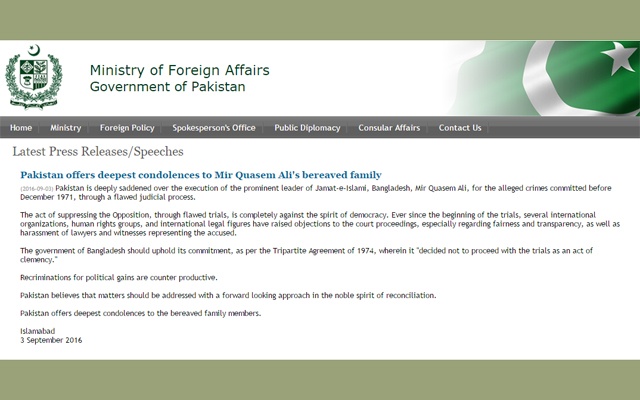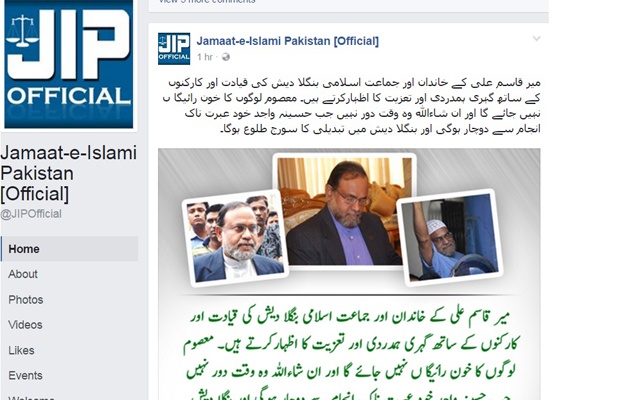Immediately after war criminal Mir Quasem Ali’s execution on Saturday, Pakistan has reacted sharply and said he was hanged through a “flawed” judicial process.
Islamabad sees the execution as an “act of suppressing the Opposition, through flawed trials,” which is completely against the spirit of democracy”.
Mir Quasem was a prominent leader of Jamaat-e-Islami that sided with Pakistan in Bangladesh’s Liberation War in 1971.
The International Crimes Tribunal handed down the maximum penalty to him for torturing freedom fighters to death as Chittagong’s Al-Badr commander.
He met his fate at 10:30pm after exhausting all legal options.
Islamabad has also offered “deepest condolences” to the bereaved family members.
Pakistan had earlier issued similar statements after the execution of war criminals. Dhaka reacted to those statements by summoning the high commissioner to the foreign office.
In the latest statement posted on the foreign ministry’s website, Islamabad said it was “deeply saddened” by the execution of Mir Quasem.
It questioned the Bangladesh’s court proceedings and its fairness and transparency, and once again reminded the government of the 1974 tripartite agreement.
“The government of Bangladesh should uphold its commitment, as per the Tripartite Agreement of 1974, wherein it ‘decided not to proceed with the trials as an act of clemency’.”
“Recriminations for political gains are counter productive,”
“Pakistan believes that matters should be addressed with a forward looking approach in the noble spirit of reconciliation.”
Bangladesh, in its previous protest against similar statements, had said Pakistan was once again acknowledging its “direct involvement and complicity” with the mass crimes committed during the Liberation War.
Dhaka had also asserted that Pakistan continues to present “a misleading, limited and partial interpretation” of the underlying premise of the Tripartite Agreement of April 1974.
“The essential spirit of the Agreement was to create an environment of good neighbourliness and peaceful co-existence.
“The agreement never implied that the masterminds and perpetrators of war crimes, crimes against humanity and genocide would continue to enjoy impunity and eschew the course of justice,” Dhaka earlier said in a protest note.
“Rather Pakistan has systematically failed in its obligation to bring to justice those of its nationals identified and held responsible for committing mass atrocity crimes in 1971,” the note had pointed out.
Pakistan Jamaat-e-Islami has also reacted to the execution and cautioned that Prime Minister Sheikh Hasina will meet a similar fate.
In a Facebook post in Urdu language, the party, of which Bangladesh Jamaat is an offshoot, said they would hold a funeral prayer in absentia for Mir Quasem.
Source: bdnews24










